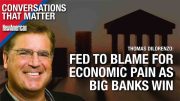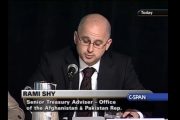
In a March 23 letter to Jamie Dimon, the chairman and CEO of JPMorgan Chase, financial professionals including treasurers, auditors, and controllers from 13 states insisted that the financial giant begin “implementing recommended best practices to prevent internal political and anti-religious bias moving forward.”
The state officials from Alaska, Arkansas, Idaho, Indiana, Kansas, Mississippi, Missouri, Nebraska, Nevada, North Dakota, Oklahoma, South Carolina, and Utah claim that the megabank may have taken part in “politically motivated de-banking of certain industries, individuals, and groups.”
“In light of this concern, we urge Chase to immediately take steps to identify and address internal drivers of political or anti-religious bias that could undermine its fiduciary obligations and impair the freedom of its customers to access financial services without fear of discrimination,” the officials wrote.
Environmental, social, and governance, or ESG, investing may be at the core of some of the letter signatories’ concerns.
“J.P. Morgan Chase has demonstrated an apparent pattern of political bias in numerous key policy and operational decisions. Several states have previously raised concerns regarding the possibility that the bank is moving to severely limit business relationships with the fossil fuel industry,” the letter charged.
“While you indicated before Congress that defunding fossil fuels would be ‘the road to hell for America,’ Chase remains a member of the Net-Zero Banking Alliance which seeks to, as part of its core mission, ‘dramatically (reduce) their (member banks) carbon financing and investment activities.'”
The state fiduciaries indicated that such practices might not be in the best interests of the financial institution’s customers.
“In effect, this entails limiting fossil fuel producers’ access to capital for reasons unrelated or even contrary to the bank’s fiduciary duty to shareholders,” the letter writers pointed out.
The writers of the letter were also wary that the bank’s apparent distaste for certain political opinions could spill over into other areas of life, such as religion.
“Recently, Chase closed the National Committee for Religious Freedom’s (NCRF) account without explanation. After repeated requests to reinstate the account, Chase informed NCRF that it would only consider doing so if the non-profit agreed to disclose detailed information about its donors and the criteria used to decide which political candidates it supports,” the letter pointed out.
Subsidiaries of Chase were even more brazen in their efforts to blend woke politics into their banking. In 2021, Chase’s online payment service provider WePay de-banked a nonprofit known as Defense of Liberty after the group promoted an event featuring Donald Trump Jr. WePay cited a policy with restrictions against groups that are said to promote “hate … racial intolerance … or items or activities that encourage, promote, facilitate, or instruct others regarding the same.”
WePay and JPMorgan Chase backtracked after Missouri treasurer Scott Fitzpatrick threatened to stop doing business with the bank. Fitzpatrick, now Missouri’s auditor, is among the 14 signatories of the letter.
After Fitzpatrick’s threat of dropping the bank, Chase would eventually recant their “hate and racial intolerance” rhetoric.
“After further review, we determined that this organization didn’t violate the terms of service, and we are reaching out to the client to discuss reinstating the account,” a JPMorgan Chase spokesperson told Fox News.
The letter is just the latest move of states against ESG-guided investment schemes. Attorney generals from 19 states have accused ESG-guided fiduciary BlackRock of putting investors’ interests on the back burner so that climate change-guided, anti-fossil fuel policies would rule BlackRock’s investment decisions.
“Rather than being a spectator betting on the game, BlackRock appears to have put on a quarterback jersey and actively taken the field,” the 19 AGs advised in August. “As a firm, Blackrock has committed to implementing an ESG engagement and voting strategy across all assets under management.”
The writers of the more recent letter to Dimon appear to believe that JPMorgan Chase might be doing the same thing as BlackRock.
“A large number of our pension funds are direct shareholders of Chase, and as stewards of our states’ investment dollars, we are concerned that the company’s recent pattern of apparent politically motivated de-banking constitutes a breach of its fiduciary duty,” the signatories told Dimon. “Under the law, you and the other officers of the company must act to maximize profit and must not subordinate the company’s long-term financial well-being to extraneous personal or political ends.”
The letter writers were adamant that Chase be more transparent with customers. The company often extols their “transparency” in advertisements, but when shareholders recently asked that the company complete a survey on their policies regarding climate change and other ESG related issues, they refused.
The state fiduciaries noted this, saying, “when provided with an opportunity to practice equal transparency on an issue of concern and import to a large number of your shareholders and customers, Chase has thus far been unwilling.”
As of this writing, neither Dimon nor JPMorgan Chase & Co. has commented publicly on the letter.




